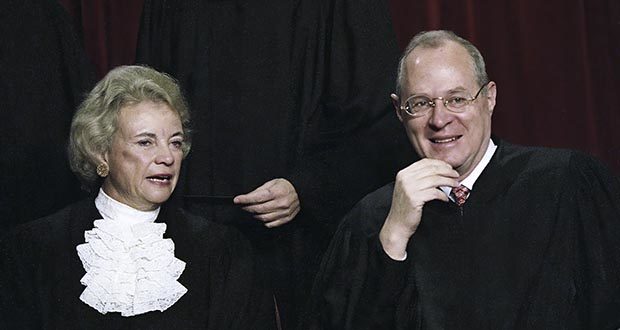The ghost of Casey and the end of the Court’s strategic operator

As Paul has already said with respect to Joan Biskupic’s inside baseball account of Robert’s flailing attempt to preserve some kind of diminished version of Roe, it makes it pretty clear that just like the other leaks surrounding the case the leak of the draft opinion came from conservative chambers, with Alito and Thomas the most obvious suspects. (It’s hilarious how hysterically the dimmer elements of the conservative legal world attacked the leak as a liberal plot in May.) As Paul also says, what may not be clear on its face is why Alito et al were ever worried about Kavanaugh’s vote. There has been nothing in any story to suggest that he was ever wavering, and his joining the de facto overruling of Roe in the Texas case should have made it clear that his vote was never in doubt:
Just two days later, Texas Gov. Greg Abbott signed a law — S.B. 8 — banning abortions at roughly six weeks of pregnancy. A challenge to that blatantly unconstitutional prohibition unexpectedly became a prelude to the Mississippi case and revealed the majority’s mindset.The same five-justice majority that would eventually strike down Roe let the Texas ban take effect at the beginning of September, dissolving abortion rights for the country’s second most populous state.Roberts, along with the three liberal justices, dissented then and in December after the court had heard oral arguments in the Texas case of Whole Woman’s Health v. Jackson and ruled.”The clear purpose and actual effect of S.B. 8 has been to nullify this Court’s rulings,” Roberts wrote, adding that “the role of the Supreme Court in our constitutional system” was at stake.The chief justice’s persuasive power was also in the balance, and his failure to convince not one single colleague to break from the majority in the Texas controversy demonstrated a loss of authority in this area of the law.
Thinking that one of the Alito 5 would flip, then, was pretty much just pure cope, unrelated to anything actually happening with this case:
While no other justice revealed interest in that Roberts’ option at oral arguments or in the weeks that followed, sources told CNN that there was still an air of possibility behind the scenes, based on Roberts’ past pattern and the knowledge that justices have previously switched votes at the 11th hour.
So the most proximate basis for a belief that a strategic deal was Roberts himself switching votes in Sebelius, actions that repelled even Kennedy and attracted only a couple of redundant liberal votes for his stupid Medicaid holding. Strategic maneuvering that worked only because Roberts was the median vote, in other words. There was never anything there.
While reactionary fears that Kavanaugh would vote to uphold Roe were irrational, though, they’re probably explained by history. While sophisticated observers in 1992 would have understood that O’Connor was never going to vote to overrule Roe and would stick with her proposed “undue burden” standard instead, and many would also been skeptical of Souter given his genuine reverence for Harlan II’s common law incrementalism, the confirmation of Thomas appeared to be the fifth vote to overrule. In addition to sure shots Rehnquist, White, and Scalia, Kennedy had never shown a hint of moderation on the abortion issue, and privately called for it to be overruled, and joined Rehnquist’s effort to overrule it sub silentio in Webster. He also voted to overrule Roe at the conference vote in Casey, but then got cold feet, proposed a joint compromise opinion with O’Connor and Souter, and stuck with is despite intense personal lobbying from his neighbor Scalia. (Which is another instructive part of the story; when justices change their votes for strategic or tactical reasons, it’s generally for personal reasons; pressure tactics are likely to backfire.) So while there was no actual reason to think Kavanaugh’s vote was in doubt, the conservatives who remembered what happened probably wanted to be extra sure.
The other relevant thing here is that the incrementalist path to overruling Roe Rehnquist first tried — which I too once thought the Court would pursue under Roberts — is no longer possible. With so many states having rushed to pass total or near-total bans, the Court would have to squarely face the question within the next year anyway. Roberts realized that Roe could only be preserved formally by also preserving something of substance. The “a relentless freedom from doubt on the legal issue” language in Roberts’s solo opinion and, perhaps more tellingly, the language in the joint dissent (“We believe that The Chief Justice’s opinion is wrong too, but no one should think that there is not a large difference between upholding a 15-week ban on the grounds he does and allowing States to prohibit abortion from the time of conception”) makes it pretty clear that what Roberts was floating was a re-definition of Roe to permit legal (if heavily regulated) first trimester abortions. And it should be obvious that there was never going to be a fifth vote for that. There might have at one time been a willingness to compromise on form, but any chance of a fifth vote for anything substantive left the building when Barrett was confirmed. The Alito/Thomas leak was ultimately just pounding the dead parrot that is reproductive freedom in America on the counter.


